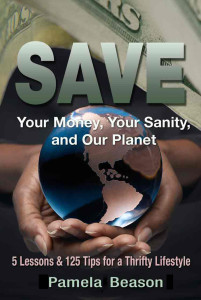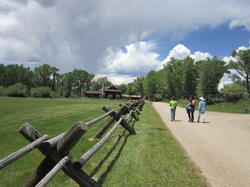Our consumer culture leads us to believe that we always need more money to buy more things. We hunger for more leisure time, better relationships with family and friends, and relief from the stress of constantly needing to earn more money for more stuff. And by accumulating all this stuff, we are, frankly, poisoning our planet. Some days I wonder if future generations will come to think it’s normal to live on top of landfills and strain garbage out of their drinking water.
I was lucky to be born into a family with thrifty parents, the children of farmers, who grew up a do-it-yourself and get-by-with-what’s-available culture. I have always had a passion for wild places and wild animals, and I want to see all the incredibly beautiful places on our planet preserved for eternity. So I’ve always been a get-out-and-do-it type of gal instead of a go-buy-it type. My closet is not full of designer shoes and clothes but of well-used hiking boots and rain jackets. My garage is full of kayaks, scuba gear, backpacks, snowshoes, cross-country skis, tools, and art supplies. I travel a lot, and give to charity each year.
 Many people express wonder at how I can do all this on a modest income. My answer is: I only spend money on what I value. This makes for a happier life for me, and one that has much less impact than the average American on the planet. I’m so passionate about this sort of lifestyle that I wrote a little book about it: SAVE Your Money, Your Sanity, and Our Planet: 5 Lessons and 125 Tips for a Thrifty Lifestyle. Although the book obviously contains much more information, here are my four best tips for developing a happy, healthy, and thrifty lifestyle:
Many people express wonder at how I can do all this on a modest income. My answer is: I only spend money on what I value. This makes for a happier life for me, and one that has much less impact than the average American on the planet. I’m so passionate about this sort of lifestyle that I wrote a little book about it: SAVE Your Money, Your Sanity, and Our Planet: 5 Lessons and 125 Tips for a Thrifty Lifestyle. Although the book obviously contains much more information, here are my four best tips for developing a happy, healthy, and thrifty lifestyle:
- Instead of giving people more stuff as gifts, give them time. Offer an evening of babysitting, ten dog walks, your help with cooking, computers, home repairs, gardening, learning a craft; whatever you know how to do that matches the recipient’s needs or desires. A gift of time is much more personal than more stuff and it never ends up in a landfill. Write your offer on a little scroll, tie it up with a ribbon or put it in a box, and proudly present your precious gift at any party. Odds are that the recipient will value your present more than the material gifts they received.
-

Have a potluck dinner with friends!
Instead of going out, host a potluck dinner at your house and play games for entertainment. Right after college, I was so broke that I had friends bring not whole dishes they’d prepared, but ingredients for dishes that we then all cooked together. We had a blast. Games don’t need to be store-bought, either. A very simple one that gets everyone talking is to pin the name of a famous person on each guest’s back and make them guess who they are by asking only questions that can be answered with a Yes or No. Home parties like this are a lot of fun, build friendships and families, and cost very little.
- Reuse everything. I even wash out and reuse plastic straws and zip-lock bags. Yes, I know they only cost pennies, but I want to keep all the plastic I can out of the trash stream and reduce the need to create more plastic out of petroleum. I often buy clothes and accessories and toys at thrift stores and also give away used items there; I trade clothes and jewelry and other stuff with my family and friends.
-

Go for a walk–it’s healthy and fun!
And here’s my biggest tip of all: stop shopping for entertainment. There are so many more fun things to do that are healthier and cost little. Go for a walk or a bike ride with friends and family, set up a volleyball or croquet game in your backyard, take up watercolors or birding or knitting or archery or building birdhouses with family members or friends. Take a class at your local community center or college.
You’ll find that when you develop a more connected and active lifestyle where you enjoy activities with friends and family, you need far less stuff. You’ll be happier and less stressed, and the planet will be a safer, healthier, greener place for all living things.
Great tips, Pam. and i know you live your own advice